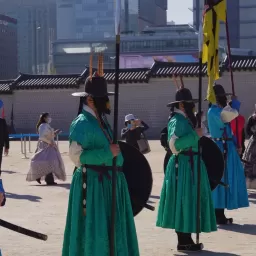Traditional Values
Korean society is a dynamic blend of traditional values modern influences
 Bonus: Korean Culture:
Korean culture is a blend of tradition and modernity, preserving its heritage while embracing contemporary influences. Let’s learn more about it.
Bonus: Korean Culture:
Korean culture is a blend of tradition and modernity, preserving its heritage while embracing contemporary influences. Let’s learn more about it.
Confucianism, originating from the teachings of Confucius (Kong Fuzi or Kongzi) in ancient China, has had a profound influence on Korean society, shaping its values, ethics, and social structure. This influence began around the 4th century BCE when Confucian ideas were introduced to Korea and continued to play a significant role throughout its history.
Key elements of Confucianism that have traditionally influenced Korean society include:
-
Respect for Elders (Filial Piety): Confucianism places a strong emphasis on filial piety, which involves showing respect and obedience to parents and elders. In Korean society, this translates into a deep reverence for older family members and a sense of duty towards taking care of one’s parents in their old age.
-
Family Values: The family is considered the basic unit of society in Confucian thought. Traditional Korean society places a high value on family cohesion, and individuals are often expected to prioritize the well-being and harmony of the family over personal desires. This emphasis on family values contributes to a strong sense of familial duty and responsibility.
-
Social Hierarchy: Confucianism introduces the concept of a social hierarchy based on relationships, emphasizing the importance of maintaining harmony within these relationships. This hierarchy is reflected in various aspects of Korean society, including the workplace, schools, and community settings. It also extends to broader societal structures where individuals are expected to follow the guidance of those in higher positions.
-
Strong Community Bonds: Confucian values stress the importance of community and social harmony. This is reflected in the emphasis on collective well-being over individual interests. Koreans traditionally place importance on community events, mutual support among neighbors, and cooperation for the greater good.
-
Education: Confucianism places a high value on education as a means of self-improvement and moral development. In Korea, this emphasis on education has led to a strong cultural focus on academic achievement, with education being viewed as a pathway to personal success and contributing to the betterment of society.
While Confucianism has significantly influenced Korean culture and societal norms, it’s important to note that contemporary Korean society is a dynamic blend of traditional values and modern influences. Rapid economic development, globalization, and exposure to diverse cultures have led to the evolution of societal values, although the core principles of Confucianism still have a notable impact on various aspects of Korean life.